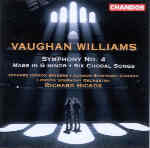Richard Hickox delivers an exciting, very swift performance of the Fourth Symphony’s outer movements, along the lines of the composer’s own or, more to the point, Dmitri Mitropoulos’ marvelous New York Philharmonic version. Actually, this symphony has fared very well on disc, with superb renditions also by Berglund, Slatkin, Bernstein, and even Handley who, like Boult and Previn, has a bit of a tendency to wimp out when the going gets heavy (but doesn’t in this work). Hickox begins at a cracking pace, perhaps even a bit too swiftly for all of the densely scored details to register, but the way he attacks the second subject is thrillingly passionate. The second movement has the necessary gravity and bleakness, the scherzo bites and snaps as it must, and the finale really smokes. The fugal coda ends with positively pulverizing force. The LSO already played marvelously in this work for Bryden Thomson, and it still does here.
The Mass in G minor also receives a fine performance from Hickox’s own small choir. This lovely work makes the strongest possible contrast to the symphony, and fans of orchestral music may balk at listening to this lengthy a cappella piece; but if you love the Tallis Fantasia you’ll find much the same sort of harmonic thought here. Hickox shapes each movement very persuasively, with the marvelous chiming conclusion of the Gloria done with especial panache, though the recording puts a glare on the upper voices that may induce ear-fatigue at high playback levels.
The Six Choral Songs–to be Sung in Time of War are scored for unison chorus and orchestra. They are brief but serious pieces, not a bit jingoistic or tub-thumping, and utterly characteristic of the composer’s melodic style. Easy to perform, the LSO chorus handles them well, though the orchestra tends to overwhelm the voices at the climaxes.
As noted, the sonics aren’t quite perfect: brilliant and impactful, to be sure, but also a touch harsh and edgy. The upper woodwinds, flutes especially, seem to sound from a location well out in front of the rest of the orchestra, which makes their contribution to the symphony’s scherzo wonderfully spiteful–but it’s hardly a natural balance. However, this minor reservation isn’t serious enough to preclude an enthusiastic recommendation, particularly since it may be unnoticeable on different types of playback equipment. In sum, this is a very enjoyable disc, the best yet in Hickox’s ongoing VW symphony cycle, and a much more impressive effort than the last installment: his less than wonderful issue of the less than wonderful first version of A London Symphony. [7/3/2002]
































